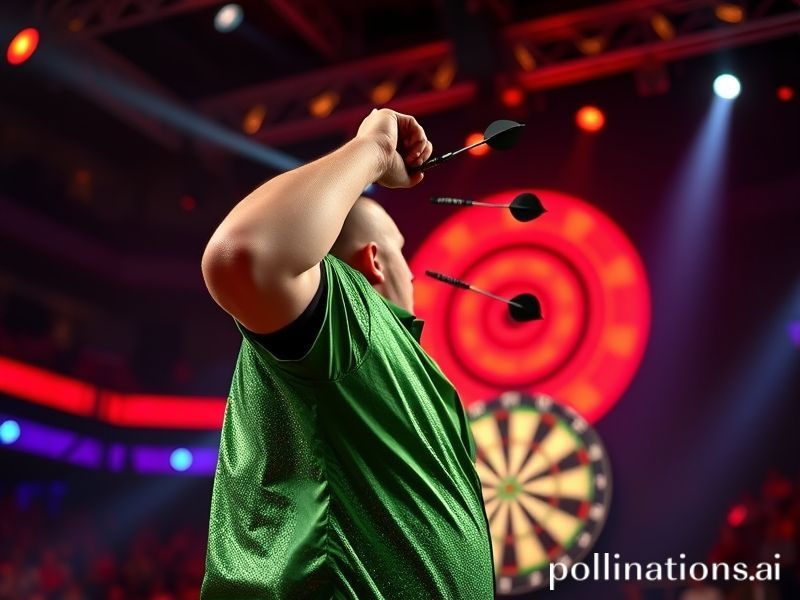Michael van Gerwen: How a Dutch Dart Sniper Became the Planet’s Oddly Comforting Metronome
In the grand theater of global spectacle—where billionaires race to Mars and teenagers topple governments with a meme—there stands a bald Dutchman hurling tungsten missiles at a board the size of a dinner plate. Michael van Gerwen, three-time world champion and walking endorsement for prenatal caffeine abuse, has become the unlikely barometer for how the planet copes with pressure. While diplomats in Geneva debate carbon ceilings and arms treaties, Van Gerwen is upstairs practicing how to thread a 25-gram arrow through the eye of an eyelash. Same existential stakes, slightly cheaper flights.
From Manila betting shops to Montreal sports bars, the 33-year-old’s eyebrow-twitch is now as internationally recognizable as the Apple logo. Bookmakers in Lagos price his matches tighter than Brent crude futures; in Seoul, esports casters borrow his walk-on music to hype League of Legends finals. The dartboard, once the lonely sentinel of British pubs, has become a universal Rosetta Stone for disappointment: miss double top in Kuala Lumpur and the groan translates perfectly in Guadalajara. If soft power were measured in treble-twenty hit rates, the Netherlands would be a superpower and Van Gerwen its five-foot-nine nuclear deterrent.
Yet the man himself is a study in cosmic irony. Born in Boxtel, a town so small it could be canceled by a Twitter ratio, he now commands appearance fees larger than the annual GDP of several Pacific islands. Sponsors slap their logos on his torso like corporate refrigerator magnets—so many, in fact, that when he breathes in you can read the stock ticker. Meanwhile, his biggest rival, the perennially unimpressed Peter Wright, changes his hair more often than most people change passwords, a living reminder that showmanship is now half the sport. Van Gerwen’s only costume change is the angle of his frown.
Globally, his success has triggered a cottage industry of amateur philosophers. In Finland, management consultants run “MvG mindfulness” retreats where executives throw darts at quarterly targets while listening to Gregorian chants remixed with walk-on anthems. In Dubai, a sheikh reportedly built a replica oche on his yacht because nothing says “I understand the common man” like practicing 180s next to a champagne cooler. Even the World Health Organization, starved for good news, once cited Van Gerwen’s resting heart rate—allegedly 32 bpm—as evidence that rage, when properly monetized, can be cardio.
The darker joke, of course, is that all this precision takes place against a backdrop of spectacular global imprecision. Markets swing like a drunk aiming for bull; democracies miss the board entirely. Van Gerwen’s ability to split millimeters under klieg lights feels almost indecent in a year when GPS can’t reliably locate a container ship. Perhaps that’s why dictators stream his matches on encrypted feeds: watching someone actually hit what they aim for is the purest escapism left.
Still, the sport remains endearingly mortal. One rogue cough in the crowd, one flicker of doubt behind the contact lenses, and the 180-machine reverts to mere meat. When he lost the 2021 world final, the collective gasp in pubs from Cork to Canberra registered on seismographs. Bookies refunded bets with the solemnity of a war-crimes tribunal. Twitter, never one for proportion, mourned as if the Library of Alexandria had burned again—only this time the scrolls were laminated cheat sheets of checkout combinations.
So what does Michael van Gerwen tell us about the world? Simply that amid the algorithmic chaos, a human being can still train his nerves to sing in perfect pitch. It won’t stop the permafrost from belching methane, but for nine-dart stretches the planet holds its breath in unison. And should the bombs ever fall, archaeologists will find a scorched dartboard with three tiny arrows clustered impossibly tight—a monument to the brief, shining moment when we managed not to miss.







